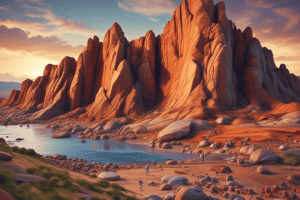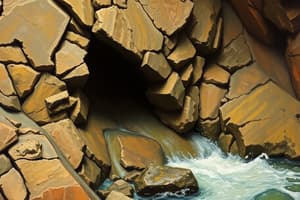Podcast
Questions and Answers
What is a common component found in sedimentary rocks that provides evidence of past life?
What is a common component found in sedimentary rocks that provides evidence of past life?
- Minerals
- Fossils (correct)
- Crystals
- Geodes
Which type of rock is formed from the precipitation of minerals around impurities in clay sediments?
Which type of rock is formed from the precipitation of minerals around impurities in clay sediments?
- Geodes
- Concretions (correct)
- Nodules
- Limestones
What characteristic distinguishes chert from flint?
What characteristic distinguishes chert from flint?
- Color (correct)
- Crystal structure
- Texture
- Location of formation
How do geodes typically form in limestone?
How do geodes typically form in limestone?
What type of sedimentary rock is typically found in layers where finer sediments settle?
What type of sedimentary rock is typically found in layers where finer sediments settle?
What process leads to the transformation of loose sediment into solid rock in clastic sedimentary rocks?
What process leads to the transformation of loose sediment into solid rock in clastic sedimentary rocks?
Which type of sedimentary rock is primarily formed from the accumulation of plant or animal debris?
Which type of sedimentary rock is primarily formed from the accumulation of plant or animal debris?
Which of the following is NOT a type of clastic sedimentary rock?
Which of the following is NOT a type of clastic sedimentary rock?
What is the primary condition for the formation of chemical sedimentary rocks?
What is the primary condition for the formation of chemical sedimentary rocks?
Which of the following is an example of a chemical sedimentary rock?
Which of the following is an example of a chemical sedimentary rock?
What geological feature formed by sedimentary rocks provides a valuable tool for reconstructing Earth’s past?
What geological feature formed by sedimentary rocks provides a valuable tool for reconstructing Earth’s past?
Which sedimentary rock type is primarily formed in arid areas?
Which sedimentary rock type is primarily formed in arid areas?
What major resources are known to be formed in, and derived from sedimentary rocks?
What major resources are known to be formed in, and derived from sedimentary rocks?
Flashcards
Clastic Sedimentary Rocks
Clastic Sedimentary Rocks
Sedimentary rocks formed from the accumulation of fragments (sediments) of pre-existing rocks.
Weathering
Weathering
The process of breaking down existing rocks into smaller pieces called sediments.
Erosion
Erosion
The process of transporting weathered sediments to new locations.
Deposition
Deposition
Signup and view all the flashcards
Compaction
Compaction
Signup and view all the flashcards
Cementation
Cementation
Signup and view all the flashcards
Chemical Sedimentary Rocks
Chemical Sedimentary Rocks
Signup and view all the flashcards
Organic Sedimentary Rocks (Biogenic)
Organic Sedimentary Rocks (Biogenic)
Signup and view all the flashcards
Strata (Layers)
Strata (Layers)
Signup and view all the flashcards
Stratigraphy
Stratigraphy
Signup and view all the flashcards
What are nodules and what are they made of?
What are nodules and what are they made of?
Signup and view all the flashcards
What are concretions and how do they form?
What are concretions and how do they form?
Signup and view all the flashcards
What are geodes and how do they form?
What are geodes and how do they form?
Signup and view all the flashcards
What are fossils and how are they found?
What are fossils and how are they found?
Signup and view all the flashcards
What are sedimentary rocks?
What are sedimentary rocks?
Signup and view all the flashcards
Study Notes
Sedimentary Rocks
- Sedimentary rocks form from the accumulation of smaller pieces of pre-existing rock, called sediments.
- There are three main types of sedimentary rocks: clastic, chemical, and organic.
Clastic Sedimentary Rocks
- Formed from abundant deposits of loose sediment.
- Existing rocks break down into smaller pieces (weathering).
- These pieces are transported (erosion) and deposited.
- Sediments are compacted (squeezed together) and cemented (mineral growth).
- Examples include breccia, conglomerate, sandstone, siltstone, and shale.
- Formation involves pressure and temperature changes at depth (3-4 km).
Chemical Sedimentary Rocks
- Formed when dissolved chemicals precipitate out of water.
- Often found in arid areas.
- Examples include iron ore, chert, some dolomites, rock salt, and some limestones.
Organic Sedimentary Rocks
- Formed from the accumulation of plant or animal debris.
- Examples include coal, amber, some dolomites, and some limestones.
- Debris contains calcium that piles up over time, especially in water bodies.
Sedimentary Rock Features
- Layering or bedding is a key feature, revealing past geological environments.
- Layers are called strata.
- These layers offer snapshots of Earth's past.
- Sedimentary rocks can contain valuable resources, including oil, natural gas, coal, and uranium.
- They are often used in construction (sandstone, limestone).
- Some rocks contain fossils—impressions of living organisms that were buried.
- Nodules and concretions are hard lumps of fine-grained silica (frequently called chert or flint) in rocks.
- Concretions are solid masses of calcium carbonate.
- Geodes are spheres of silica rock (often containing crystals like quartz and calcite).
Practice Questions
- Question 1: The order sedimentary rocks are likely deposited in a stream-lake system would be conglomerate, sandstone, shale, in that order from upstream to downstream.
- Question 2: Chemical and organic sedimentary rocks both form through geological processes and have layering/strata. Chemical rocks form from dissolved minerals precipitating. Organic rocks form from the accumulation of plant and animal debris.
- Question 3: Layering/stratification is a common physical feature in all types of sedimentary rocks.
Studying That Suits You
Use AI to generate personalized quizzes and flashcards to suit your learning preferences.




